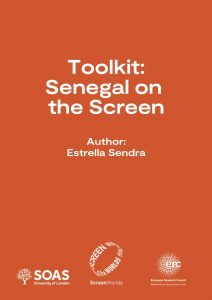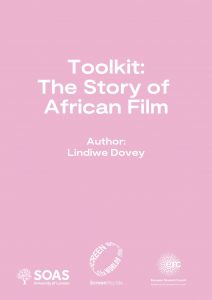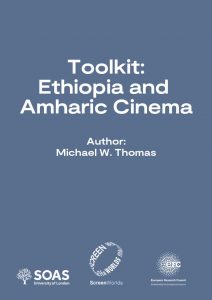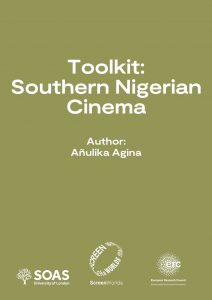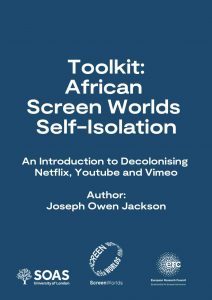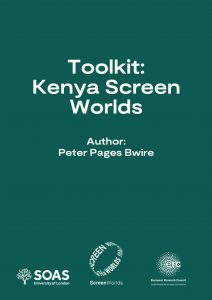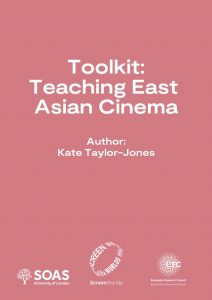Reflections on Creating Film Toolkits to Decolonise Academia and the Film Industry
Lindiwe Dovey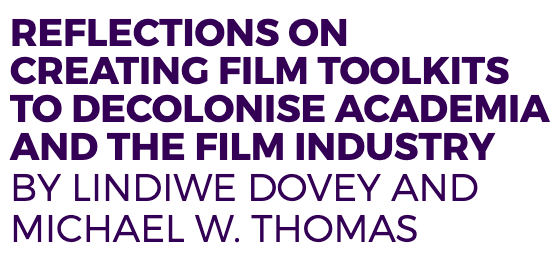
The five-year, European Research Council-funded project Screen Worlds: Decolonising Film and Screen Studies began in June 2019, and is based at SOAS University of London. As part of this project, we have started developing free, open-access toolkits that present key films and relevant, related readings from areas of the world that tend to be marginalised in Film and Screen Studies, and in the mainstream film industry. Our focus to date has been on sub-Saharan Africa, with our first toolkits (available here) offering: a syllabus for teaching sub-Saharan African cinema; and vital films and scholarship in relation to southern Nigerian cinema, Amharic-language cinema in Ethiopia, Kenyan screen worlds, and cinema in Senegal. The latter toolkits, focused on national cinema contexts, have been designed to complement the broader African film syllabus by showing how entire modules could be developed that delve into specific African filmmaking contexts, or how this kind of specificity could be used to enrich broader film and screen studies (and other disciplinary) teaching. By focusing initially on national contexts in these toolkits, we do not mean to elevate the idea of national cinemas above other ways of considering cinema, and in future toolkits we will explore other regions beyond Africa (and especially Asia), as well as different frameworks, showing how a curatorial approach to teaching and researching cinema can help us to find connections between filmmaking traditions in diverse global contexts.
But why have we felt it necessary to start creating such toolkits, alongside our other project outputs (which include films, audiovisual essays, edited books, and journal articles)? A large part of what we have been concerned with is how inaccessibility to marginalised films and scholarship obstructs other attempts to decolonise; we constantly encounter colleagues (film scholars, film programmers, film distributors, and filmmakers) who are interested in trying to decolonise their work, but who simply do not know where to start in sourcing and accessing the films that are needed to do so. For each of us who has authored a toolkit to date, our deep relationship to the material has often been a labour of love, and has involved many years of searching for films, spending our own money buying those films once we’ve found them, traveling to remote film festivals or places, and forming respectful relationships with the filmmakers.
A significant problem with trying to share the knowledge and resources we have gathered is that, while we might individually own a large range of rare films, we do not own the rights to be able to share these films with others. The cornerstone of our work on the toolkits has thus involved trying to find and collate information about where such films can be publicly and legally accessed – for example, how institutions and individuals can buy this work on DVD or on streaming sites, and how much-needed revenues are returned to the filmmakers (and, we should note, that sometimes the latter is mutually exclusive to the former). We are well aware that our recommendations to date are circumscribed by the locations in which we are based and/or travel to regularly, and that while, for example, it may be easy for someone in the UK to buy a DVD from Amazon, this is not the case in many African and Asian countries.
Similarly, geo-blocking presents a significant barrier when it comes to streaming, with – for example – a site such as Netflix offering very different films in diverse locations (on this topic, we highly recommend Ramon Lobato and James Meese’s free online book Geoblocking and Global Video Culture). In many contexts in which we work, there is also a lack of access to high-speed internet or an inability to pay the significant amount needed to stream data through phones; geographical and financial inequalities thus play a huge role in determining who has access to which films, and this of course needs to be foregrounded in any film research or teaching project engaging with decolonisation.
The question of what we mean by ‘decolonising’ is worth delving deeper into here as it has been a hotly debated topic in academic circles since the #RhodesMustFall movement was initiated by students at the University of Cape Town, South Africa, in May 2015. In our field, the history of cinema has been one dominated by Hollywood and by mostly male, Caucasian, heterosexual filmmakers and their visions of the world. Since the 1980s, however, there has been a welcome shift brought about by the proliferation of digital technologies, and the global reach of the internet. We are now in an age where the formerly established barriers of audio-visual production (the studio system for example) have been complemented and even challenged by regionally focused, commercially oriented, low-budget film industries (such as those of ‘Nollywood’ and the Amharic-language industry in Ethiopia).
Hollywood, with all of its financial might, now makes up only a part of a global screen landscape in which filmmakers from, for example, Nigeria, India, South Korea, Japan, Hong Kong, and mainland China project their own worldviews on screens around the globe. In this more decentralised global screen landscape, our specific focus is to draw attention to the developments of multiple screen industries – in Africa, Asia, and beyond – and to probe what these overlooked examples can teach us about the nature of screen content, production, distribution and consumption in the world today. Our use of the word “screen worlds” is vital here; our project aims to move away from the problematic term “world cinema”, which draws an artificial boundary between “the west” and “the rest”, to acknowledge the deeply transnational nature of contemporary global film influences, flows, and labour.
While Hollywood used to be a staple in most Film Studies curricula, today there would appear to be hundreds of courses on “world cinema” – many of them seemingly taught in a way that encourages students to consider the surface aesthetics of films from different parts of the world, and not how those films and their production and consumption are influenced by the underlying cultures from which they emerged. For us, the term “screen worlds” is intended to conjure the specific “worldviews” that filmmakers invest in their films, as well as the new technologies that mean it is no longer adequate to speak only about “cinema”.
Something we have also discussed a great deal is our desire not to canonise new films in this process of creating toolkits – this is where acknowledging authorship of the particular toolkits has become important, as a way of foregrounding our own individual taste, as well as our attempt to provide users with thorough, useful overviews based on our longstanding research and work in academia and the film industry. Our work on the toolkits is necessarily ongoing, and we primarily see ourselves as curators (suggesting films and scholarship we love and want to share with others) and as facilitators (where, even if we cannot tell someone in a certain place exactly how they can access a particular film, we might be able to connect them with the maker or distributor of that film).
We also by no means want to imply that we should have the final say on how the field can or should be decolonised, and we warmly welcome others from around the world to submit film and screen studies curricula, syllabi, and toolkits with a decolonial focus to us to make available on the Screen Worlds website. We have also been concerned to workshop our toolkits and seek critical feedback on them, and are extremely grateful to all the participants of the “Decolonising Film and Screen Studies” workshop we organised at the University of Lagos, Nigeria, from 16-18 March 2020 for the ways they have also contributed to this first set of toolkits.
The idea behind making the toolkits has been partly inspired by our involvement with broader decolonising work at SOAS University of London and beyond, and we hope that the toolkits may also be of interest to academics in a range of other disciplines, since film can be an inspiring teaching aid in fields that can otherwise remain quite abstract. Film is an affective and emotional medium that tends to invite viewers into the worlds and life experiences of the individuals it foregrounds; it takes us beyond statistics and can help us to empathise with people who are very different from us. Depending on our positionality and lived experiences, film can also prove a difficult medium because of its indexicality and immediacy, and films that might be painful for certain groups should be adequately curated and contextualised.
In these first iterations of our toolkits, we have only been able to focus on providing content, rather than also reflect on pedagogy. Readers might be interested in the series of films the Decolonising SOAS working group is developing as a complement to our Decolonising Learning and Teaching Toolkit – you can see the first film here. One of our toolkit authors, Lindiwe Dovey, also has an article forthcoming in the Spring 2020 issue of the open-access journal PARSE in which she writes in depth about pedagogy in relation to her module “The Story of African Film.”
A major concern of ours, even from before we began work on the toolkits, is the issue of language and the Anglophone dominance over most academic fields, including ours. Despite the drawback of having to resort to the English language (even though many of us in the team have other linguistic competence), English is also the language through which the decolonising movement has been primarily expressed, and we have even found it difficult to translate the term ‘decolonise’ into African languages – a reminder of how we constantly need to be alive to the context-specific nature of any decolonising movement or claim. Instead of imposing this term onto other languages and epistemologies, we are more interested in engaging with pre-existing decolonial methods already in use in various places in the non-western world. In this way, we are encouraging participants in our broader project to theorise local film traditions via the epistemologies and philosophies of the cultures from which they have emerged and not feel beholden to the common terminology employed in Film and Screen Studies discourse.
The issue of language also potentially limits the accessibility of films produced in other languages that do not have subtitles or dubbing. For example, the legacy of the English language within Anglophone Africa has arguably enabled scholars easier access to the English-language film industry in Nigeria whereas the Amharic-language film industry based in Addis Ababa, Ethiopia, remains less accessible to those who do not speak Amharic, as films rarely have subtitles due to the domestic focus and insular nature of the industry. This lack of English subtitles has been a crucial factor in deciding which Amharic films we can select for our Amharic cinema toolkit. However, from a decolonial perspective, we wish to note that, paradoxically, this resistance to the English language may precisely be one of the most decolonised aspects of the Amharic film industry. We need to be wary about blindly believing that global visibility and accessibility is necessarily a positive thing, and respect where certain cultures may not be interested in the “universal language” that Dziga Vertov excitedly proclaimed for film in the 1920s.
Accessibility is also an issue when wanting to share African films more broadly. Many films can be found illegally uploaded on free video streaming sites but this of course has a detrimental impact on the livelihoods of the filmmakers, legal distributors or rights holders of such films. We do not condone such activity but we admit that it is sometimes the easiest way to access films and one can argue the right to fair use for educational purposes, as many of those who make audiovisual essays from such material do. When it comes to the legal purchase or screening of rare films, this can often only be afforded by institutions (universities, film festivals, film archives) based in North America and Europe, meaning that far more people in these regions have been able to see African and Asian films than people living in Africa and Asia.
In many cases, older films have not been digitised, and are lost in archives in Paris or New York – or, worse still, have been lost to the world because of celluloid’s inherent fragility. In some cases, non-western filmmakers have been compelled to enter exploitative deals with rights holders which has meant that they have lost access to their own films and it is now unclear from whom to seek permission to screen or license clips of these films. While organisations such as Martin Scorsese’s World Cinema Foundation are doing important work to restore such films and make them accessible for screening, we need to ensure that these works are also available in the places from which their filmmakers hail, otherwise our decolonising work will be far from complete. For our part, along with our toolkits, we will be making all our Screen Worlds publications, films, and audiovisual essays open access and free of charge on our website. We have been inspired on this front by ventures such as Catherine Grant’s Film Studies for Free platform, and also by academics who have – in a spirit of openness – made their syllabi freely available online.
The most important ethic for us as a team is to be respectful of everyone we work with, and to be open and engaged with our partners. In our more general vision of decolonising, we understand it as a reciprocal process through which educational institutions and the film industry can better respond to this contemporary moment we live in, and make amends for injustices in the past. Exercises in partnership building across social, cultural and geographic divides are crucial in helping us to understand and navigate myriad screen worlds. We are continually seeking to learn from, reach out to, and engage with people and to encourage others to participate in our project in ways that they choose. This positions the whole Screen Worlds project as a dynamic, dialogical venture which aims to build on people’s grounded experiences and legitimate expertise while also acting as a crossroads through which connections can be made to inspire future collaborations that might have nothing to do with us. We see ourselves as part of a broader, decolonising movement that aims to erode the boundaries between academic and non-academic spaces, and that believes in making academic knowledge open access and freely available to wider communities. We wish to keep working with people who share our vision and values, and whose dream is to work towards a world in which such decolonising toolkits are no longer needed.
About The Authors
Lindiwe Dovey and Michael W. Thomas are writing on behalf of the Screen Worlds Collective
The Screen Worlds Collective is formed of the core team for the Screen Worlds: Decolonising Film and Screen Studies project (see www.screenworlds.org), as well as certain key collaborators from different cultural and national backgrounds (in this case, Dr Estrella Sendra, a specialist on Senegalese cinema, as well as Mr Peter Pages Bwire, a specialist on Kenyan screen worlds).
The project is led by Lindiwe Dovey, Professor of Film and Screen Studies at SOAS University of London, a specialist on sub-Saharan African cinema. The senior researcher is Kate Taylor-Jones, Professor of East Asian Cinema at the University of Sheffield. Dr Añulika Agina is the Postdoctoral Fellow in Nigerian Screen Worlds, and Dr Michael W. Thomas is the Postdoctoral Fellow in Ethiopian Screen Worlds. With many of us involved in making films, organising and curating film festivals, and/or distributing films, we have a special interest in impact beyond the academic world, and the Screen Worlds project aims to help decolonise the film industry at large.
You can read more about the project, and the people involved, here: https://screenworlds.org/about/
Originally published in Learning on Screen’s Viewfinder Magazine

